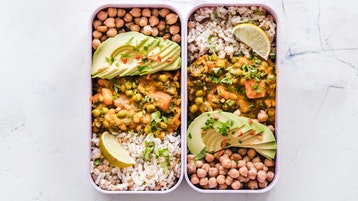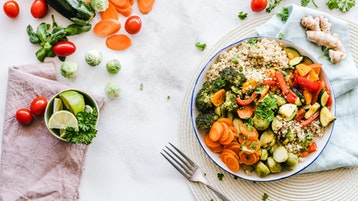If you are consuming meat or not, you may have already wondered if it is possible to gain muscle mass by being vegetarian or vegan, right?
This is because people say two things a lot: that to gain muscle mass it is necessary to eat enough proteins; and the other is that vegetarians / vegans cannot consume enough protein.
Therefore, due to these two beliefs, we believe that it is not possible for those who do not consume animal foods to gain muscle.
In this article you will see that things can be quite different from popular belief.
Index
What are the main obstacles for those who do not consume animal foods?
How to gain muscle mass by being vegetarian or vegan?
All about proteins
What is the difference between animal and vegetable protein?
What are the best vegetable proteins?
How much should you consume?
Supplements
What are the main obstacles for those who do not consume animal foods?

We can summarize the main obstacles for those who do not consume animal products in gaining muscle mass. They are:
- Insufficient calorie consumption;
- Insufficient protein consumption;
- Insufficient consumption of essential amino acids so that the formation of new muscle proteins can occur;
- Insufficient consumption of some micronutrients. For example: vitamin D, iron, zinc and vitamin B12.
The good news is that it is possible to solve all these problems in a practical way so that you can have excellent results using only proteins of plant origin.
Also, if you want to know more about how to do a vegetarian or vegan diet for hypertrophy, see this post Vegetarian diet for hypertrophy.
You can gain quality muscle mass by buying steroids on https://buysteroidsgroup.net/
How to gain muscle mass by being vegetarian or vegan?
First, before we talk about proteins, which is usually the most discussed topic, I will reinforce other points.
In order to achieve muscle hypertrophy, some factors are necessary: a high calorie diet, training to generate muscle stimulus and adequate rest.
And of course, above all, have patience. You need to stay motivated and dedicate yourself consistently to build muscle mass.
So in order for you to build muscle you need to eat more calories than you expend. This diet should contain good fats, carbohydrates and essential amino acids from foods that are sources of protein.

It is important to emphasize that consuming more calories than you spend is not an excuse to eat everything you see ahead and increase your weight and gain a lot of fat together.
And if you eat a relatively healthy diet following a vegetarian or vegan style, you are probably eating a lot of fiber.
And this, in turn, can make it difficult to eat large amounts of food because it promotes satiety quickly. Thus, the consumption of food with lower fiber content and with simpler carbohydrates is interesting at certain times of the day so that you can get enough calories. Examples are: white rice, pasta and natural juices, for example.
As well as foods that are sources of good fats, they are also a good option to increase the amount of energy ingested.
This high consumption of carbohydrates and moderate fats serves to support the body so that the protein ingested is used for the formation of muscle mass and other tissues and not to provide energy.
All about proteins
What is the difference between animal and vegetable protein?
The difference between both is that proteins of animal origin have all the essential amino acids for muscle building in adequate amounts. Vegetable proteins also have all amino acids, however, the problem is that some of them are present in very low and insufficient amounts.
Thus, one way to solve this problem is to always combine different sources of vegetable proteins throughout the day so that one completes the essential amino acid that is missing in the other.
The combination of foods from different groups provides all the amino acids in an optimal amount.
What are the best vegetable proteins?
We have several options to achieve your daily protein goal using only plant sources. We have, for example, vegetable protein sources in 100g of food:
- Pumpkin seed: 19g
- Lentils: 6.3g
- Black beans: 4.5g
- Almond: 21.2g
- Tempeh *: 19g
- Tofu: 8g
- Oats: 13.9g
- Quinoa 14,1g
* Tempeh: it is a food obtained by the fermentation of soybeans and has a texture similar to that of meat.
Protein Supplements
In addition to several foods you can also choose to use some protein supplements to facilitate the intake of proteins in your day-to-day and help you gain muscle mass as a vegetarian.
Supplements are great options for your post workout or to replace a solid meal at some point in the day.
Currently, there are several sources of protein powder, for example:
- Soy protein
- Pea protein
- Rice protein
- Egg and whey protein (for ovolactovegetarians)
In addition to facilitating protein intake, powdered supplements have the advantage of having less fat and carbohydrates than ordinary foods.
How much should you consume?
When the goal is to gain muscle mass, protein consumption does not need to be as high as in a diet that aims to reduce body fat while maintaining maximum muscle.
This is because in a high calorie diet the high intake of other nutrients saves the use of protein for secondary functions other than the construction of new proteins in your body.
However if we consider that you want to gain muscle mass by being vegetarian you will only consume proteins of plant origin (or part of the milk and eggs in the case of ovolactovegetarians) there is an important detail.
Proteins of plant origin have a lower digestibility when compared to animal. So it is interesting to consume a little more to make up for this issue.
Evaluation studies and protein requirements do not confirm the recommendation of different protein intake between vegetarians and non-vegetarians.
For a healthy diet, the ideal is to try to reach at least 0.8 to 1.2g of protein for each kilo of weight. However for hypertrophy, the goal is to try to reach 2g of protein for each kilo of weight.
Depending on the need for calories to be ingested, it is not always possible to beat these 2g of protein per kilogram of weight. What we see is that even with a lower proportion of proteins, it is possible to have good results of hypertrophy.
Completing
- The main obstacles for those who do not consume animal foods and want to gain muscle mass by being vegetarian are: insufficient intake of calories, proteins, essential amino acids and / or some micronutrients.
- The first thing for those who want to gain muscle mass is to follow a high calorie diet, that is, with more calories than they spend during the day. In addition, proper training and rest is required.
- The vegetarian / vegan diet is often high in fiber. This can make it difficult to eat large amounts of food because it promotes satiety fast. Choose carbohydrates with less fiber at certain times of the day.
- Plant proteins have all the essential amino acids, but one or more are present in insufficient quantities.
- Among the main sources vegetable proteins we have for example: pumpkin seeds, lentils, tempeh and powdered supplements.
- The intake of vegetable proteins should be slightly higher than when compared to proteins of animal origin. This is because they have less digestibility throughout our body.
